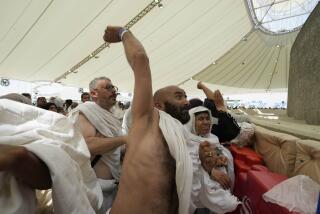U.S. Muslims Shine New Light on Ancient Tradition
- Share via
A historic split on when to observe a key Islamic holiday this week left many worshipers across Southern California bewildered and upset, but also hinted at the growing influence of American Muslims in the Islamic world.
At the heart of the division is a seemingly simple question: When can you catch sight of the new moon?
But a large block of American mosques--relying more on science and less on the human eye--this year came to a different conclusion from authorities in Mecca, Saudi Arabia.
And because Islamic holidays are based on the lunar calendar, the two different answers led to two different days to celebrate the holiday of Eid ul-Adha.
The one-day discrepancy even left some households divided.
“When I told my daughter the celebration was Tuesday, she told me, ‘No way, it’s Monday,’ ” said Haitham Bundakji, president of the American-Jordanian Assn. of Southern California.
His daughter observed the holiday--the culmination of hajj, the annual pilgrimage to Mecca--on Monday, along with most of the Islamic world. Bundakji ended up celebrating both Monday and Tuesday.
American Muslim leaders say their goal is to nail down, through astronomy and public opinion, a unified Islamic calendar. Predetermined holidays would help Muslims in the United States, estimated at more than 6 million, with everything from reserving large venues for celebrations to getting time off from work.
Hajj begins eight days after the new moon is sighted. In Saudi Arabia, Muslims search the sky and, when they spot the new moon, report the news to Islamic judges. If the witnesses are deemed trustworthy, and another level of judges approves, the lunar month begins.
But in February, the new moon was sighted when astronomers that American Muslims had consulted said there was no new moon to see.
“Sometimes only one or two people see it, and that’s the problem,” said Dr. Muzammil Siddiqi, president of the Islamic Society of North America and a major proponent of the change. “In the old days, this was the way. But now, there are so many things flying on the horizon--satellites and planes--that people can be easily confused.”
Siddiqi said he’s planning to meet soon with both American and Middle Eastern Muslims to see if an agreement can be hammered out.
“We don’t oppose [the current] system; we want to refine it,” Siddiqi said. “In the long run--and it may take a few years--we hope to help all Muslims see a more accurate sighting [method].”
Spotting a new moon isn’t as simple as it sounds.
“The problem is, we can calculate the exact moment of new moon,” said John Mosley, an astronomer at Griffith Observatory. “But the trick is knowing when we’re going to see it first.”
Atmospheric conditions--humidity, smog, even forest fires--can delay the sighting, Mosley said. But American Muslims want to eliminate those variables--plus the possibility of premature sightings--and begin the lunar month when astronomers say the new moon could be seen.
One-day differences for Islamic holidays aren’t unusual, because the dates often rely on Muslims throughout the world who spot the new moon. For Eid ul-Adha, though, American Muslims in past years have followed the decision made in Mecca, since the pilgrimage takes place there.
But in November, leaders from two influential U.S. Islamic councils--backed by Muslim scholars--agreed to begin the lunar month only when astronomers agreed the new moon could be seen.
“This is an American phenomenon,” said Shabbir Mansuri, founding director of the Council on Islamic Education. “Muslims here tend to be much more courageous, as we Americans in general tend to be.”
Even so, once it came to celebrating on a different day than Mecca, local Muslims were given an unwelcome jolt.
“It created a big commotion and confusion for our community,” said Bundakji, who reported fielding 70 calls this week. “[The holiday] didn’t feel as good as it did other years. We are usually a unified voice on that day. It made a very, very big difference in our hearts.”
Amin Khan, an Alta Loma resident, observed Eid ul-Adha on Monday, but was frustrated to find that many of his Muslim friends were waiting until the next day.
“It’s a day of celebration, but we couldn’t celebrate with all our friends,” Khan said. “I don’t care which way they do it, but our elders should sit down and decide on one date.”
Maher Hathout, a spokesman for the Islamic Center of Southern California, said he personally favors using the strictly scientific method.
He believes that the Islamic world will eventually adopt that standard. But in the meantime, Muslims shouldn’t be too worried, he said.
“Islam allows both interpretations,” he said. “The only problem is: People inflate the issue. Sighting the moon is a bit subjective, and Islam doesn’t have a central authority or pope. But we should focus on this essence of the Eid--which is self-sacrifice--and not a silly disagreement.”
More to Read
Sign up for Essential California
The most important California stories and recommendations in your inbox every morning.
You may occasionally receive promotional content from the Los Angeles Times.













